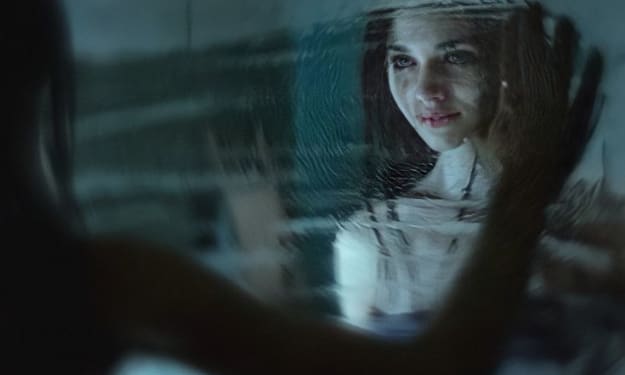Do You Believe in Magic?
Holiness goes on, long after the faith is gone.

Some families are insane and have veritable crematoriums of skeletons in their closets. Schizophrenics and slave owners married victims of incest and had secret, secondary families in other states. These families had kids who did drugs and fought with their parents or bottled things up and went on shooting rampages. As outsiders, we can say we know a strangely, seemingly normal pairing or slice from the family, but if asked, those oh so typical people can relate that still waters run deep.
The other kind of family is the kind of family we don’t know well enough yet to have heard about the child kept in the basement, the uncle who killed someone in a drunk driving accident, the well-to-do rapist. And, if you really think about it, the longer you know a family whose tragedies continue to appear as concluding with rolling credits and a laugh track, the crazier they appear.
So, it isn’t surprising that most of us have complicated relationships with our own families. Some even hate them, or at least say that they do. Why is it then that we feel compelled to protect the tribe that expelled us? Where does the compulsion come from that tells us to defend our alcoholic uncle or our racist nephew? Any armchair student of psychology or sociology can answer this in a way that sounds academic, but it’s unsatisfying to hear an otherwise intellectual and moral person defend their sadist grandmother or explain away the actions of a deadbeat brother. Perhaps, that’s the only thing it can be. After all, if a true story is satisfying, isn’t it the exception, rather than the rule? Isn’t it only because we hear just enough to know about happily ever after, rather than what happens later?
This is a true story.
My first two years of teaching in and around Baltimore left me demoralized and, quite frankly, sick. At one point, I developed such an unhealthy work/life balance that I more or less stopped sleeping to be able to exercise and see friends once in a while. That fall I got impetigo because, as my doctor said, I functionally didn’t have any immune system left. So, with the ignorance and confidence of a middle class white man in his early to mid twenties, I decided it was time for me to change the world for the better. I applied for the Peace Corps.
I was accepted. Soon, I was invited to sub-Saharan Africa. Then, I began to put in paperwork to defer my student loans.
“I’m sorry, sir, because your loan with Citibank is private, by that I mean not a federal one, it will not defer.”
“Excuse me? I’m supposed to be leaving in a few months for the Peace Corps.”
“You’ll need to pay it off before going overseas. Or you can continue to make payments on it while you're there.”
I had been familiar with the word “consequences” at that point in my life but not in any way that might indicate I shouldn’t have, say, given my job notice as soon as I found out that I’d reached the invitation stage of the Peace Corps induction. So, I went to South Korea to teach. I loved it, but the capitalistic, rabidly competitive nature of education there pushed me for more change, and one night I found myself at a bus stop that reeked of fish in a tiny village in eastern Thailand. I was supposed to be the volunteer project coordinator for a nonprofit, vetting sites, recruiting and training volunteers, and marketing projects to interested parties. I wouldn’t be very good at it, but I didn’t know that yet.
My first few days were a flurry of activity: I learned the important things about the town, the names of my coworkers and who did what, and the ins and outs of how the company functioned. I also met my boss and his family: he was an Oregonian who had married a Thai lady. They had three kids, the oldest was in his early teens.
From the beginning, my boss and I got along very well, and by the second or third day, we were already ribbing each other in a good-natured way. I had talked to him on the phone a few times before arriving in the Kingdom of Thailand, but I didn’t know the man very well at all. We were both pretty easy going guys, but it was still a trifle awkward, considering our relative unfamiliarity and our sudden and constant proximity. An expat for the better part of three years at that point, it wasn’t the first time a relationship of that type had become a matter of necessity, and it wouldn’t be the last.
“We’re going to the Wat tonight for a ceremony. You should come. Take pictures and stuff. It’ll be good for the website,” he said.
“For sure, we can always use more original content,” I agreed.
“You can ride with us. I’ll pick you up at five. No shorts. Collared shirt. You know the drill.”
I did. In fact, I’d participated in any number of odd customs while overseas, having been pushed, persuaded, even bullied into doing things that were cringe-inducing at the time. It was neither cultural appropriation nor lite-colonialism. I’m not sure what it was, only that the people doing it to me seemed to really enjoy watching me fumble about in a hanbok or grin awkwardly as the flash went off, commemorating the time that the pasty guy got suckered into this or that Buddhist ritual.
At this point, it’s pertinent to bring up the fact that I had been raised as a Jehovah’s Witness. I knocked on doors. I argued with people about John 1:1 and Greek language with regard to the Holy Trinity. I think I knew to quote Romans 6:7 and Ecclesiastes 9:5 to believers in the doctrine of hell before I could read the words in those passages. At twenty-six, however, I was a recent conversion from agnosticism to atheism and couldn’t have cared less if we were attending a Hindu temple or a Catholic church. It was all the same to me: these were expressions of primal instincts that avoided confronting uncomfortable truths in the human mind. Still, people found solace there, so what right did I have to mock them? Besides, my boss might be a Buddhist. I figured I’d put on my game face, take some respectful pictures, bow and imitate praying at the right times, whatever. It wasn’t like my lack of a god was going to come for me for participating in something I didn’t believe in.
So, I sat, crossed legged and somewhat painfully, next to another curious westerner from where I worked, and she sat next to my boss and his family. I took pictures when I saw other people doing it, so as to not offend. I bowed and pretended to pray. After the novelty wore off, the ceremony dragged on for quite a while. By the time the seven of us were piling into the enormous SUV to leave, night was setting in, I was tired. I felt like having a beer and some good conversation. The sun had recently dipped below the horizon, and the dark countryside flowed by our windows as my boss drove us back to town.
“Ever do anything like that back home?” he asked.
“Go to a Wat? No. Ha. I was raised as a Jehovah’s Witness. We went out and argued with people about stuff like that.”
“Oh yeah? A Jehovah’s Witness, huh?”
“Yeah, I stopped really believing by the time I was, I dunno, sixteen? But my parents still are. So, I sort of paid it lip service till I moved out. Just easier that way, you know?”
I was used to a lot of jokes about Jehovah’s Witnesses, but having been raised as one, I knew the polemic surrounding it very well. After all, how do you knock on people’s doors to argue one of the two least polite subjects if you don’t know what you’re going to say? And even with it distantly behind me, I’d get defensive when people found out how I’d been brought up. It was as if to say, okay, yes, the Jehovah’s Witnesses are nuts, but what you believe isn’t any less crazy. I took a breath and waited for whatever jab was coming my way. I wouldn’t be angry. I made fun of the Witnesses as much or more than anyone else. The way my boss and I had been interacting, I figured it was an absolute certainty that he was going to make some kind of a crack about it. I’d roll my eyes at him. It would be a thing. Whatever. There was about as much noise inside as there was light outside. No moon. I glanced at the girl who’d also come along. She’d said she wasn’t Buddhist earlier. A couple of the other westerners from work had come, newbies in the country, wanting to see what they could see. They’d ridden in a van.
“I guess,” I said, breaking the silence, “The Jehovah’s Witnesses see themselves as, like, the Special Forces of religion. They’re going to go in and seize the converts.”
It felt stupid even before I’d finished overemphasizing “seize,” so I just resolved to change the subject if no one else said anything.
“The Church of Jesus Christ of Latter-day Saints has missions where they go out and talk to people about religion,” my boss said.
Oh great, I thought, he’s comparing the Witnesses to Mormons. I’d known a few of them back in Maryland. The Defense Department was crawling with them. Because of their evangelism, I’d heard the two compared quite a few times, and, even though I was completely unreligious, I’d always sneered at the equivalency. I don’t think I really can be objective about it having come from one and not the other. To wit, once a person explains that they believe a talking snake convinced a woman to share a piece of fruit with her husband, and that action caused every ill, from the chickenpox to war, it seems to me that trying to base any comparison of related teachings on logic is just window dressing, right?
“Well, I’m not religious anymore. I just figure the most good, for the most people, for the longest time. Right?”
Most of the car was silent at that point. The kids, huddled in the back of the SUV, were playing some sort of game. We rolled on through the night.
“Hey man, you, uh, wanna grab a beer at Frenchie’s?” I asked, thinking that it might be nice to chill with my new boss. I thought that maybe he’d make the standard, “I didn’t know JW’s drank,” comment or something like that. Or, it might be, “next thing you’ll be telling me you dance, too.” I’d heard a lot of them from people who knew nothing about the Witnesses.
“Well, we don’t drink,” he said.
The comment struck me sort of sideways. Not “I don’t drink.” That was when it dawned on me that he was talking about the Mormon church. Oh, right, I thought. This is the Jehovah’s Witness joke. You’re a JW. I’m a Mormon. Okay. Right. Well, one good turn deserves another.
“Do you wear the magic underwear, too?” I asked, remembering what I’d learned about the “sacred garments” they supposedly wore.
I waited for the expected chuckle at the repartee. It never came. The silence dragged on and on, and with it came the realization that I’d just insulted his religion in front of his whole family and the young lady who was sitting next to me. She’d traded looking out the window for an aghast expression I’m fairly certain I was mirroring. The moments dragged on. The awkwardness changed the consistency and temperature of the atmosphere inside the air-conditioned vehicle to that of the rank humidity of outside.
My eyes wide, I mouthed, “I am so fired,” to my seatmate. The silence was so suffocating, I wondered if she might throw herself from the SUV to avoid it. She didn’t. Some interminable amount of time later, we slowed outside the beach shack where Frenchie served beer when he had it. I would find out later that he regularly didn't.
“You want to get out here?” said my boss. I was a little shocked. It wasn’t combative. It wasn’t anything. He was just offering to drop me off. I exhaled for the first time in what felt like an hour. There were a few lights on, and I could see Frenchie animatedly holding court.
“Yeah,” I said. “I’ll, uh, I’ll see you tomorrow.”
I got out and wandered over to the table to the sound of waves crashing a few meters away. The night was balmy from the ocean breezes. I figured that no matter what happened the next day, I couldn’t really make it worse by having a beer or two on the beach. After all, what was the worst that could happen at that point?
I didn’t get fired. I would go on to learn a lot there, but it was a comedy of errors in retrospect. Some months later, I would laughingly relate to the patrons of Frenchie’s bar that I had just recently read about statistics surrounding the number of people from Iceland who believed in fairies. An enormous, bald tourist would stand up, slam his hands down on the table and scream, “That’s because it’s true!” If memory serves, I told my friends that I was going to give up talking.
I didn’t.
About the Creator
Emile Bienert
I am probably not a wizard.
Enjoyed the story? Support the Creator.
Subscribe for free to receive all their stories in your feed. You could also pledge your support or give them a one-off tip, letting them know you appreciate their work.






Comments
There are no comments for this story
Be the first to respond and start the conversation.